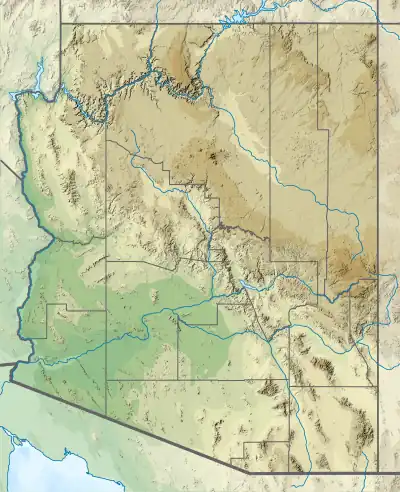Chaistla Butte
Chaistla Butte is a 6,098-foot (1,859 m) elevation summit located south of Monument Valley, in Navajo County of northeast Arizona. It is situated 4.5 miles (7.2 km) northeast of the community of Kayenta, on Navajo Nation land, and can be seen from Highway 163. It is one of the eroded volcanic plugs, or diatremes, of the Navajo Volcanic Field, which is a volcanic field that includes intrusions and flows of minette and other unusual igneous rocks which formed around 30 million years ago during the Oligocene.[4] Chaistla Butte rises 400 feet (120 meters) above the Little Capitan Valley, and the 1,000 by 700-foot base pokes up from the Chinle Formation.[5] Its neighbors include Agathla Peak and Owl Rock, three miles (4.8 km) to the north-northwest. Precipitation runoff from this feature drains into the Laguña Creek drainage basin. The chaistla name, which means "beaver pocket" or "beaver corner" in the Navajo language, was officially adopted in 1915 by the U.S. Board on Geographic Names.[2][6] Navajo teachings have its name meaning "to support the sky's underside", such that if this butte were to fall, the world would end.[7] It is also known as Turkey Butte.[8]
| Chaistla Butte | |
|---|---|
.jpg.webp) West aspect | |
| Highest point | |
| Elevation | 6,098 ft (1,859 m)[1] |
| Prominence | 548 ft (167 m)[1] |
| Parent peak | Segeke Butte (6,721 ft)[1] |
| Isolation | 2.36 mi (3.80 km)[1] |
| Coordinates | 36°46′51″N 110°12′26″W[2] |
| Geography | |
 Chaistla Butte Location in Arizona  Chaistla Butte Chaistla Butte (the United States) | |
| Location | Navajo Reservation Navajo County, Arizona, U.S. |
| Parent range | Colorado Plateau[3] |
| Topo map | USGS Agathla Peak |
| Geology | |
| Age of rock | Oligocene |
| Type of rock | Volcanic breccia |
| Climbing | |
| Easiest route | class 5.x climbing[1] |
Climate
Spring and fall are the most favorable seasons to visit Chaistla Butte. According to the Köppen climate classification system, it is located in a semi-arid climate zone with cold winters and hot summers. Summers average 54 days above 90 °F (32 °C) annually, and highs rarely exceed 100 °F (38 °C). Summer nights are comfortably cool, and temperatures drop quickly after sunset. Winters are cold, but daytime highs are usually above freezing. Winter temperatures below 0 °F (−18 °C) are uncommon, though possible. This desert climate receives less than 10 inches (250 millimeters) of annual rainfall, and snowfall is generally light during the winter.[9]
Gallery
References
- "Chaistla Butte - 6,098' AZ". listsofjohn.com. Retrieved 2020-12-03.
- "Chaistla Butte". Geographic Names Information System. United States Geological Survey, United States Department of the Interior. Retrieved 2020-12-03.
- "Chaistla Butte". peakvisor.com. Retrieved 2020-12-04.
- Steven C. Semken, The Navajo Volcanic Field, in Volcanology in New Mexico, New Mexico Museum of Natural History and Science Bulletin 18, p. 79, 2001. ISSN 1524-4156
- Transactions of the Kansas Academy of Science, Volume XXX, 1920, page 270.
- Will C. Barnes, Arizona Place Names, 1988, University of Arizona Press, page 87.
- John Holiday and Robert S. McPherson, A Navajo Legacy: The Life and Teachings of John Holiday, 2005 University of Oklahoma Press, page 360.
- Sandy Nestor, Indian Placenames in America, 2015, McFarland and Company Publishers, page 22.
- "Kayenta, Arizona Köppen Climate Classification". Weatherbase. Retrieved 2020-12-04.
External links
- Weather forecast: Chaistla Butte
- Aerial video: Gettyimages.com
- Chaistla Butte pronunciation




